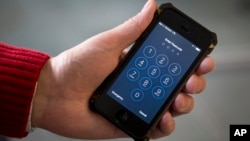Leaders of two key U.S. Congressional committees involved in national security joined together Wednesday to propose the creation of a national commission to explore the sometimes conflicting issues of privacy and security in the digital era.
Rep. Michael McCaul (R-TX) chairs the House Homeland Security Committee and Senator Mark Warner (D-VA) is a leading member of the Senate Select Intelligence Committee. Together, they’re calling for the creation of the bi-partisan “McCaul-Warner Digital Security Commission” that would “bring together experts who understand the complexity and the stakes to develop viable recommendations on how to balance competing digital security priorities.”
“This is a 9/11 style commission to address the biggest challenge to federal law enforcement I’ve ever seen in my lifetime,” said Rep. McCaul during a discussion at the Bipartisan Policy Center in Washington. “If you can’t see what the terrorists are saying, you have a very urgent security issue.”
The proposal was months in the making, but comes just as digital privacy and national security have moved front and center in the legal standoff between Apple Computer and the FBI.
Apple and the FBI have been at loggerheads since a U.S. district judge issued an order forcing Apple to help the FBI break into a locked iPhone allegedly used by one of the two shooters in last December’s San Bernardino terror attacks. Apple CEO Tim Cook has so far refused to comply with the order.
Encryption
Since 2014 the FBI has repeatedly expressed concern about the spread of encryption on digital devices, with FBI Director James Comey warning that “encryption threatens to lead all of us to a very dark place.”
“This isn’t a commission on encryption,” said Sen. Warner. “Encryption is here to stay, and it protects America’s personal and financial information and intellectual capital. Digital security is the purpose [of the commission]; this is not a battle between privacy and security.”
Cornell Tech Associate Professor at Cornell University Tom Ristenpart agrees.
“Privacy versus security? That’s a pretty broad brush to apply. It’s a complicated situation. These technologies are both for privacy and security, so one person’s security measure might be another’s investigative hurdle," he said. "Saying this is some kind of choice that Americans need to make between their information privacy and their security in terms of safety is too loaded of a framing.”
Ristenpart acknowledged that some terrorists and other criminals are using various encrypted apps and devices to communicate. But, he says, the encryption genie is already out of the bottle, for bad actors as well as good.
“Preventing Apple from securing their phones for average users isn’t going to stop the terrorists from using encryption, it’s just going to degrade average user’s security,” he told VOA.
Cornell’s Ristenpart says the new commission should consider not just the limits of technology, but of the law as well.
“What I’d love to see come out of this commission is a recommendation on the procedural issues – when it’s valid to get a warrant to get access to data,” he said. “There should be some judges who are approving these warrants but there should be privacy advocates, and we’ve seen some of that evolving out of the Snowden revelations.”
Congressional responsibility
Sen. Warner and Rep. McCaul aren’t just members of differing political parties; their professional experiences outside Congress mirrors in some ways the competing interests at stake.
Before being elected, Rep. McCaul was a federal prosecutor and Chief of Counterterrorism and National Security for Texas's branch of the U.S. Attorney's office. For his part, Sen. Mark Warner was an early telecommunications developer and investor and has deep connections within the tech community and Silicon Valley.
“We’re in unique positions to bring stake-holders together to find a solution to a Paris-style attack where terrorists were using end-to-end encryption, said Chairman McCaul. “We want to act in Congress to prevent that from happening in the U.S.”
“Congress has a responsibility to act on this,” he added.
The McCaul-Warner bills are expected to be officially introduced in both chambers of Congress next week.





